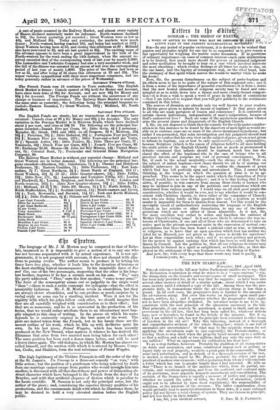tfrtaitts.
The language of Mr. J. M. Morton may be compared to that of Babe- laia, inasmuch as it is impossible to given notion of it to any one who has not become acquainted with it by actual experience. It is not epi- grammatic, it is not pregnant with sarcasm, it does not abound with allu- sions to passing events. The author seems to produce it by letting his fancy have free play, whether it leads him -to the iteration of truisms or the most startling logical inconsequence. In his inimitable farce of Box and Cox, one of the two personages, suspecting that the other is his -long- lest brother, inquires if he has a certain snark on his arm. "No,'! says the party addressed. " Then," says the fiffit speaker, "come to-my arms!" The force of the nonsequitur comes out so palpably in the single word "then "—there is such .a noble contempt for ffyllogian—that the effect is irresistibly. ludicrous. Mr. J. M. Morton revels in absurdities, but they are always clever absurdities, and he can produce as much surprise by a verbal reply as some can by a startling incident. Were it not for the rapidity with which his jokes follow each other, we should imagine that they are all carefully weighed with consideration as to their effect.; but they are so numerous, and he is so unwearied -in the production of his farces, that we would rather-attribute them to an idiosyncrasy most hap- pily adapted to this class of writing. In the pieces on which his name depends; he is eminently original in the best sense of the word. The plots are indeed taken from the French, but in his hands these are the merest outline of his work, which he fills up with drolleries quite his own. In his last piece, Friend Waggles, which has been recently produced at the New Strand, what matters it whence he has derived the dilemmas that arise from two married men being taken for each other ? The same position has been used a dozen times before, and will be used a dozen times again. The odd dialogue, in which Mr. Morton has almost ex- celled himself, and the unction with which it is uttered by Messrs. Comp- ton, Cooke, and Shalders, form the real substance of Friend Waggles.


























 Previous page
Previous page